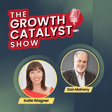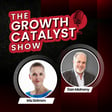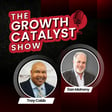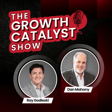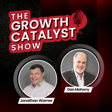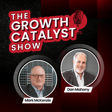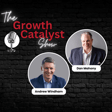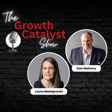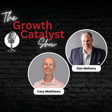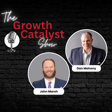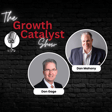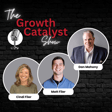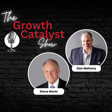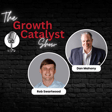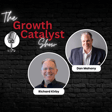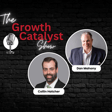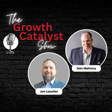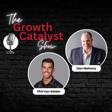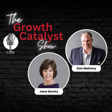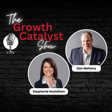Become a Creator today!Start creating today - Share your story with the world!
Start for free
00:00:00
00:00:01

Peter Thelen: Strategic CPA Guidance for Thriving Businesses
Join Peter Thelen, CPA and founder of Thelen Financial, as he shares expert advice on navigating the complexities of financial management for businesses. Discover strategies that empower growth through sound financial practices and insightful tax planning. This episode is a must for entrepreneurs looking to elevate their business performance.
Transcript
Show Introduction and Host Background
00:00:00
Speaker
Welcome to the Growth Catalyst Show where we believe that growth can come in many forms, professional, personal, company, sales, you name it. I'm your host, Dan Mahoney, founder of Transcendent Sales Solutions and a guide to a world of growth possibilities. I've spent my career empowering companies and their people with strategies that accelerate growth.
00:00:18
Speaker
I'm here to bring you stories of these business leaders and their trusted advisors to gain insights into their journeys and learn how they fueled their own growth. Just maybe their journey could become part of your own growth story. Are you ready? Let's grow!
Guest Introduction: Peter Thielen
00:00:35
Speaker
Welcome to the next edition of The Growth Catalyst Show. I'm your host, Dan Mahoney. My next guest, Peter Thielen, is a certified public accountant and founder and president of Thielen Financial. He is an accomplished operations finance and accounting executive who provides key strategic leadership in complex and expanding businesses. Peter, welcome to The Growth Catalyst Show. Thanks, Dan. Thanks for having me. I finally got you on. Yeah, I was dodging you for a while.
00:01:05
Speaker
You were, and we made a deal the other night when we were out partaking in spirits and cigars that we were going to light up and drink while we're doing this. Do you remember? Yeah, they don't they don't let me smoke in here. Yeah, and I would probably get kicked out of my home office if my wife smelled cigar smoke when she got home. All right, we're going to kick right we're gonna have to power through it, buddy. We'll kick right in. so ah Appreciate you being on the show.
00:01:31
Speaker
So again, everybody that knows you or doesn't know you, they can tell very quickly.
Peter's Background and Education
00:01:36
Speaker
You're from Texas. Yep. Born and raised Georgetown. Born and raised. You got that little, you got that little longhorn cup here. There's not a crack in it, is there? Nope. So tell me, where are you from actually in Texas?
00:01:54
Speaker
um Born in Georgetown, lived out in a place called Liberty Hill for most of my life. And then a little place you've never heard of called Briggs, which is near Colleen, Fort Hood. And then ah went to college out in Lubbock. So lived a little bit everywhere. So the initially, and again, not my I didn't do well in geography. So literally Georgetown, is is that is that North or is that Austin area? I don't know that.
00:02:22
Speaker
It's central, it's just north of Austin. It's like the Alpharetta of Austin. The Alpharetta of Austin, okay, all right. Okay, and now you're in the Alpharetta of Alpharetta, right? There you go, Alpharetta, Atlanta. So Lubbock, Lubbock lubbock is west Texas, isn't it? Way west, six and a half hours. Yeah, like closer to New Mexico, kind of. Yeah, it's about an hour and a half east of from New Mexico.
00:02:49
Speaker
So how did you end up in Lubbock, Texas for college? but There's got to be a story behind this. So, um, I had a athletic director of the league that I played basketball in and my,
00:03:03
Speaker
Junior year, I think it was, he he was like, we've come so far, our league's come a long ways and really proud of everything y'all have done. He said, one day I really hope to have some college level talent, some people who we can you know send off to play in college from this league. And I kind of took that as a slap in the face that we weren't good enough. So I made it my mission to find a school to let me play and that's what I did. I love a Christian university, was dumb enough to let me play basketball for him.
00:03:33
Speaker
So tell me about your collegiate basketball career, which by the way, I never really knew that. So this is new to me. It was short lived. I made the team. Practiced a lot. um Only average, maybe a minute or less per game.
Journey into Accounting and Career Start
00:03:51
Speaker
Did get a few rebounds. I think I scored one, but I actually got to play against Jay Crowder twice, which was he went on to do some great things in the NBA. he was phenomenal to play against. He was a phenomenal basketball player. Um, but yeah, once it it became clear to me, I wasn't going anywhere with basketball. I, I, uh, bailed on that.
00:04:16
Speaker
You sound like you had Mike, I had a basketball career like that in junior high and in high school, they'd bring me in and the coach would say, do not shoot the ball. I need you to go and maybe get a rebound, but foul people. Yeah, that might've been the goal.
00:04:33
Speaker
That's right. If you don't get it. And of course I took the shot. Every time I got the damn ball, I'd take a shot, right? Yep. Throwing it up. Oh, and he putting it up. So going into college, other than, you know, being the next Larry bird, uh, what was your, what was, what was your aspiration? What did you want to do? You know, I had no idea. I, uh, the,
00:04:57
Speaker
and admissions advisor that I was assigned to happen to be the dean of the accounting department. and I'm sitting there doing my paperwork and they you know the athletes all have their own admission day. so It's just you know the athletes on campus that day and we're doing the paperwork and he goes, so what's your major going to be? I said, what's a major? I don't even know what that means. so He explained all that to me. I said, oh, I get it. My dad wants me to be an engineer.
00:05:25
Speaker
And he said, well, we don't have an engineering program, but the account we have accounting and it's basically the same thing.
00:05:33
Speaker
Wow. You only did no X's and O's, right? So that's how I ended up in accounting. He was like, fine, sign me up. And you actually stayed with the county and that was it through, through it through the four years or the five years or the six or whatever. Well, I messed up and got a 4.0 that first semester. And I was like, this is easy. And, uh, you know, the rest of this history week, I, uh, stayed with that, that professor, you know, he was there a lot. And, uh, at the end he, my roommate and I both did the same track and he told us at the end, he's like, man,
00:06:11
Speaker
I didn't think you guys were going to make it through the program when y'all signed up. So I guess it was meant to be. It was meant to be. So I saw, as I was looking at your, uh, looking at your work background, I saw officer at Lubbock Christian University and I was thinking, oh, he got into an accounting officer and everything. You were like a, like a police officer, like a resource officer.
00:06:36
Speaker
Yeah, so after I quit the team, obviously you lose your scholarship for that, so. Oh yeah, oh that. So I got a job with the security police department there on campus, and that worked out great, because I could study all the time. It was a pretty small campus, it was pretty quiet. And you didn't have to carry a gun? It's just being recorded, no guns.
00:07:06
Speaker
no No guns. It's Texas. Yeah, right. It's it's Texas. it' actually that where we go That's right. So, well, how did you, i how did you end up in Atlanta? How, you know, you're in Texas, you're all over Texas, and as far west as Texas is Lubbock is, how did you end up in the Atlanta area? What brought you here? So the landscape company, Landmark Landscapes reached out to me my senior year right before I graduated. They were looking for
00:07:37
Speaker
a controller so I see it though. They were really small. They were about $6 million in revenue, struggling to make a profit. I thought that would be a great opportunity. I had been working for a big corporation. A big corporation, you get pigeonholed. Like I was doing fixed assets, I did fixed assets five days a week, 52 weeks out of the year. I thought it'd be a great opportunity to come up here and do the whole picture, get a good education on business.
00:08:07
Speaker
And so that's that's how I ended up here.
Entrepreneurship and Thielen Financial
00:08:10
Speaker
Just got a call, got a job, and just, boom, let's move to Atlanta. Yeah, my daughter was three weeks old when I moved. Your oldest this was three weeks old? Yeah, yeah. It actually was supposed to be about a month longer than I had, ah but what happened was,
00:08:35
Speaker
ah The owner was corresponding with me and I wanted to be you know all professional. and So I hand wrote a acceptance letter and I mailed it to the office. and the The lady who was doing the bookkeeping and stuff got that letter and resigned the next day.
00:08:55
Speaker
oh Got it. so she So they called like, hey, Susan resigned. We're going to need you to start now. Great letter, but... Yeah, yeah. So we ended up moving, sold our house in about two weeks and moved. And yeah, my oldest daughter was, what did I say? Three weeks old, six weeks old? She was six weeks. And now you have three. Yeah, I got three. You have three. That's awesome. So yeah, I didn't know you started your family here. I didn't know when you actually moved. Yeah. Well, it was right after college.
00:09:34
Speaker
So when did you blend in finding the time to, you know, get your CPA? Oh man. I, uh, I did that at night. I often studied, uh, you know, get home at six, seven at night, have a little dinner, get the kids to bed and then study till, uh, two AM often. Yeah. Get up and do it all over. I'm taking it. That was harder than your, uh, four year degree.
00:10:03
Speaker
Oh, way harder. Yeah, no, the CPA exam is, uh, it's nothing to sneeze at. I had it to do, I did take about a two year break between college and that if I had to do over, I would have just studied for the CPA as part of my senior year and then just rolled into it. But, uh, you know, I'd say it's 2020, right? I had the 14 year.
00:10:28
Speaker
gap between getting my MBA and actually I found it easier and as as I'd worked in the work that it it was a lot easier for me to do it than i I don't think I was ready to do it out of college. Sure. Yeah. No, that makes sense. Yeah. Everybody's different. So so you're you know you you you started Theland Financial Partners and you started it at a very young age. You decided to become an entrepreneur. How did you decide to pivot from Landmark, which are I think if If I remember you telling me you were at Landmark for like over eight years, right? Uh, nine or 10. Yeah. Yeah. So you're at Landmark for a long time. How did you all the sudden just go, you know what? I'm ready to go out on my own. Um, so being in the landscape business, I've worked closely and networked closely with a lot of, uh,
00:11:18
Speaker
small business owners and that kind of stuff. And I got a lot of people wanting to take me to lunch, pick my brain, figure out what we were doing, figure out what they could do with their business. And, you know, was just one of those things. I was like, you know, I can i can make ah some consulting dollars and help people out here at the same time. And so I kind of started that before I left Landmark and was just doing those informal things. um And then a Landmark was sold and a private equity deal. And um yeah, I worked out a little period of time with them and then went out on my own, started out only doing fractional, what I called fractional CFO work. It was just consulting as a CFO and outside CFO. um
Financial Advice and Tax Insights
00:12:06
Speaker
And then a lot of those clients started saying, hey, why aren't you doing our tax moves and that kind of thing. And so we, we we
00:12:15
Speaker
rolled that in and then, you know, I found the the CPA world, uh, outside of CFO work to be more interesting for me, for my personality. And so here we are today. Are you sorry you got into taxes? Uh, you know, only some days, only some days, which it's about it. Those days are about to start as we, as we enter the tax year. Yeah. They started about two days before Christmas this year. It's very strange.
00:12:43
Speaker
so early. Yeah. Yeah. I thought I would have a nice quiet Christmas. We went back to Texas and it was constant emails and people calling and it was crazy. Well, you know, tell me a little bit about more. I mean, you do tax and you do do some consulting, you know, you know, what's a typical client look like for you? That's doing business with dealing financial. Let's take a moment for a quick word from our sponsor.
00:13:10
Speaker
This episode of the Growth Catalyst Show was brought to you by Transcendent Sales Solutions. Whether your company is facing uncertainty, declining sales, or resource limitations, Transcendent Sales has the solution. Their team has decades of experience helping businesses find alignment to meet their growth goals and transforming underperforming sales organizations into revenue producing market leaders. they take a hands-on, results-oriented approach to solving sales challenges. Visit TranscendenceSales.com to learn more and subscribe to the biweekly Growth Catalyst newsletter for insightful growth strategies. Transcendence Sales Solutions, empowering businesses to reach new heights. And now back to the show. Most of our clients are in the trades or in the service. They're all in services. They're either trade services or or professional services. So um typically,
00:14:01
Speaker
one to five owners of either you know some kind of business, a partnership, or an S-corp, or in some cases C-corps, but most likely the partnerships and S-corps. And then you know they're they're usually offering services, either other consultants or accounting firms or law firms, or they're on the trade side and they're offering services like landscaping, HVAC, um any of the trade services. And so those are kind of our two broad silos, if you will, and size wise, you know, typically have a handful of employees, up to a lot of employees.
00:14:40
Speaker
um Majority of them are in that. yeah five to $20 million dollars of revenue range. It just depends on the business. um Yeah, you hear that. It sounds like a wide range, but like a $20 million dollars company that doesn't make such profit might be a small business. So $5 million dollars company that makes 90% profit, you know what I mean? Like it just depends on the business. And yeah, so that's what we do. And we we typically ah have year-end services with our clients. So, she you know,
00:15:12
Speaker
going through their books for getting ready for the tax return, doing their tax return, and then on up from there with all the CPA services compiled statements, reviewed statements, audited statements, just depends on what their needs are. um
00:15:28
Speaker
A few select clients, we have of engagements throughout the year, various things where we'll either look at their books with them, you know do some kind of planning stuff, but most of our clients are, you know we'll do our planning on the front end, spring maybe, June maybe, and you know go from there. but like Our goal our goal of goal is always to be accessible.
00:15:53
Speaker
So on we're on the as I mentioned, we're on the eve of another tax year, basically, or right in it. What are a few things you see business owners overlook when it is time to get ready for taxes or start doing their taxes as you go through and look look backwards, basically? oh You mean overlook at the end of the year? Like, wouldn't that be their stuff?
00:16:17
Speaker
but just overlook like, you know, like, Hey, I should have been doing this last year. It could have been a huge tax savings for me or Oh my God, I've done this so many years this way. I wish I would have known I would have done it differently. You know, probably the biggest missed opportunity for the smaller pass through entities is retirement accounts. A lot of people are like, oh, I'm going to set up a retirement plan. Well, a year goes by, we get the end of the year. Hey, did you set up that retirement plan? Nope. Okay. and then Well, maybe they do set up retirement plan, they forget to fund it.
00:16:51
Speaker
cashflow, whatever, and they never fund it. So the retirement plan is probably one of the biggest missed opportunities that's caused by the business owner. um Another big missed opportunity I see in the trade services a lot is is mismanagement and depreciation. That's not so much on the business owners, it is on the and CPA.
00:17:13
Speaker
So you know you'll see CPAs, 179, everything. Well, they might be in a really low tax bracket year, and so they get this huge deduction in a low tax bracket year. It doesn't save them as much. if you manage you know If those guys manage that depreciation better and they take the larger deductions in high tax bracket years, they'll get bigger bang for the buck. Yeah, I know. I remember in capital equipment, it is always, yeah, take the 179 all at once, but yeah, it makes a lot of sense.
00:17:42
Speaker
um What do you see anything different, drastically different as we are? I'll start thinking about our 2024 taxes versus what we had to deal with our 2023 tax years. It's nothing drastically different this year. There's a some changes in depreciation, but there's some noise that that'll be retroactively reinstated.
00:18:08
Speaker
24 stuff is, I mean, I'm sure there's some other changes, but the biggest change that I've run across so far is the mileage increase went up. and The mileage deduction went up another like three and a half cents. So but payto ring yeah for yeah, for the tax year 24. Oh, okay. I think it's like 67 cents now, isn't it? Yeah, and it is 67. It was like 65 or 64 and a half.
00:18:34
Speaker
I use mileage IQ, so it just runs, and then at the end, I go, oh, okay, here's what it was. so yeah that's Really, nothing major. but Well, nothing. Yeah, not nothing that affects like the the middle market and small market businesses.
Debt Avoidance and Client Success Stories
00:18:48
Speaker
There's no like major changes out there. 100% bonus depreciation went to 80%. That's a big change for people who use bonus depreciation. But again, like we're expecting that to most likely be put back to 100% retroactively. We'll see what happens. But even that, I mean, you know.
00:19:13
Speaker
um You've owned a business for for a very successful business and have grown it nicely over the last few years. You know, as an entrepreneur, looking at it from an entrepreneur's lens, what are some things you've learned along the way to run a successful business?
00:19:29
Speaker
Stay out of debt. Find a way to stay out of debt or use smarter debt. You know ah you don't want to go run you know biggest, greatest, easiest thing to do is just go get a credit card, put a bunch of shit on a credit card. um Those can come out to bite you if you're not careful with that. um So you know finding ways to to get your business off the ground without that kind of debt is it's pretty ah important.
00:20:02
Speaker
Watch the debt. What else? any any Anything else that comes to mind? you know pu Put good people around you. you know you' Just Circle of Friends is going to have a huge impact on the future of your business and and how you proceed. So putting good advisors around you, putting good networkers around you, these are pretty important things. Can you tell me a success story of a business you've been working with and how you've been able to help them? Oh man, I wish you had told me you were going to ask that so I could think about it.
00:20:41
Speaker
ah right off I'm telling you as I said we don't plan anything on this show it's it's it's right at you yeah um yeah there's a lot man um you know so you mean now like right now in my phone or yeah sure of course no names just you know what the impact you've had ah well we had uh we had a non-profit that The attorney had filed their non-profit. He didn't really mess it up. He just, the client didn't understand what had occurred and therefore what needed to occur. So some things got, some balls got dropped. And he ended up with penalty notices like $60,000. They get real aggressive with the non-profits. We got them out of all of it um because we were able to go back, unravel what had been done, file the correct things and get it all filed for them.
00:21:39
Speaker
you know there was another There was another one, recently not not not as recently, a year or so ago. It took a couple of years to unravel. The prior CPA had ah misfiled some S-Corp elections.
00:21:54
Speaker
and so There were a number of years that didn't get processed and so we were able to go in and Get the S election retroactively accepted to the date we wanted it accepted and then get everything reprocessed. I think we got out of that without without any penalties. I'm not may have been a couple, but.
00:22:14
Speaker
but That's actually a common one. I see that probably three or four times a year, often not as bad as as that particular one. It's usually just one year, and that's easier to unravel, but happened. That was an easy one because you know that's and that's fair and that because that customer of yours was me, and and you kind of stole my thunder because i was that was my testimonial for you, and that's exactly what happened.
00:22:37
Speaker
you know i picked the I had the wrong CPA who didn't follow through on things, and when I switched to that ah from just being an LLC to filing as an S corp, that S election wasn't filed, then I didn't know it for two years until I didn't know until, and I remember how you found out as, hey, why won't the IRS accept your return electronically?
00:22:58
Speaker
And why are you sending it on paper? And you didn't know. And we sent it, I forget what we did. We might've sent it it on paper until we figured out, cause we didn't know. And then yeah it was a huge mess to unravel and you helped me unravel it. And it took, it took almost two years and and it wasn't, and it wasn't because of your not at the two years that have to do your efforts. It's because of the, you know, the probably a half a million IRS agents that we have that have been busy doing other things so. Yeah, the wheels of the IRS turned slow. I'm on about a year working with an individual who. She got real bad advice. She divorced and got the house and sold the house, but it was a rental. It wasn't the house she lived in and someone, her barber, I think told her, oh, well you don't have to file that you get an exemption.
00:23:53
Speaker
Two years later, she gets a notice for tax on the the gross amount of the house instead of the profit of the house, because the IRS had no idea of the profit. They just knew how much it sold for. and um So she's sitting here with this notice for like $200,000 in taxes this and you know, that's simple. It's a slam dunk case. It's real simple. And in fact, I've actually spoken with someone at the IRS to like, yeah, we understand exactly. I'm like, okay, well why does the client keep getting these notices? And she's like, Oh, well this other department has to process it and then has to go to this other department and they have to do this. And it's like, you know, nobody knows what the other one is doing.
00:24:30
Speaker
Exactly. Well, not only did you help me get out of a mess like that, but you've helped me get more disciplined in a lot of different areas of my business, including the 401k. And I was one of the owners who um who had a SEP and I was putting in, but wasn't definitely putting into what my ah financial what what I was able to and how much I could max it out. And um You know, and my financial advisor, of course, didn't agree because he liked me being in my set, but it was a good move. And you give good sound tax advice and gives good sound business advice. And as a client, I always appreciate that about you and you are available and you do help out through the year. And that's, that's something that's very much appreciated. Well, thanks Dan. So last question.
Contact Information and Closing Remarks
00:25:19
Speaker
If somebody wants to find out more about feeling financial partners and how to get ahold of you, what's the best way to do so?
00:25:27
Speaker
Uh, just call my office. Yeah. Which is you want the number? Yes. 6, 7, 8, 5, 2, 6, 6, 8, 8, 3. Okay. And do you, and what do you have a website? Yeah. It's the one financial.com. T H E L E N. Yeah. Financial dot.com.
00:25:51
Speaker
yeah All right. Well, listen, I think so. Are you checking now? You're going to check and just make sure. just for produce just think on financial back com He's got other people handling that kind of stuff. So, yeah so Peter, listen, I want to thank you for you know what you do. you're You're a leader in the community. You do a lot with Rotary. You do a lot with charities. ah You're on the board with one of the chapters of the Georgia Society of CPAs. You're a family man. um you You do it all. And I heard you've got a pretty good golf game too. so
00:26:29
Speaker
You know, so listen, I just want to thank you for everything you do and most importantly, right on the eve of starting the crazy period of your time. Thank you for taking a few minutes be beyond the Grove Cattle Show. Yeah, thanks, Dan. I appreciate you having me.
00:26:44
Speaker
And that's a wrap for today's episode of The Growth Catalyst Show. Remember, you can take these stories of growth and make them part of your own and I look forward to our next journey together. If you've enjoyed the show, please subscribe and leave a review. Until next time, keep growing.
